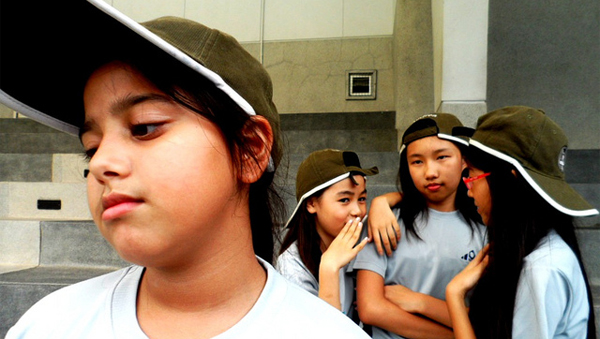With kids heading back to school, one important topic to cover is mean girl bullying. We typically think of it as a middle-school phenomenon, but it's now happening at younger ages. ParentMap's Hilary Benson joined KING 5 to talk about the problem of young mean girls and how parents can prepare their daughters for more difficult social situations before the school year begins.
What does young mean girl bullying look like in the first- or second-grade set?
It can be cruel words, rumor-spreading, systematic teasing. ParentMap had a discussion on its Facebook page and some parents said it even started in kindergarten. A study done at SUNY Buffalo in New York found that some girls understand these tactics as young as preschool.
The official term for it is relational aggression. As girls get into third grade, girls get more sophisticated and true cliques begin to form. Also, you see actions with intent to hurt. In kindergarten through second-grade girls, they may not intend to hurt; they are trying establish their place on the social ladder and don't realize what pain they are actually causing.
One of the hardest things about this for these younger girls is that it can be their best friend who is also their bully. These yo-yo friendships can be destructive for the girl who doesn't know day-to-day if her friend will play with her, or round up groups of friends and create a club that only she cannot be a part of. Research shows that the collection of mean-girl experiences over time significantly impact a girl's ability to learn.
Do schools and teachers pick up on this?
Often parents and teachers dismiss them as part of being a girl, saying, It's what girls do, or Girls will be girls. With younger elementary school girls, parents are not as attuned to watch out for it because it just seems too young for it to be happening. But if you talk to teachers in our area or in different socio-economic districts, they'll tell you they see it.
Anti-bullying programs usually focus on managing physical aggression, so the issue of mean girls falls outside the scope of the majority of programs. Boys tend to be more physical, so if there is a fight on the playground with one kid pushing another off a play structure, there is cause for concern. The school does not want a child breaking an arm.
Most anti-bullying programs don't focus on friendship issues, and for girls, that's where the aggression happens.
What can you do as a parent, especially when the bully could be the girl's best friend?
If there's a safety issue where your child is in danger or endangering someone else, get professional help.
You'll want to prepare daughters for what they might face with a new classroom full of girls. There are different dynamics each year. Here are some tips:
- Build strong connections at home. You want to empathize and be a good listener. But that doesn't mean asking leading questions to imply she has been wronged.
- Validate the range of emotions. Help your little girl understand that all emotions, positive and negative, are normal and that bad emotions don't make girls bad. Use statements like, I can hear how angry you are about what happened. It hurts when friends are mean. Allowing your daughter's anger or resentment to play out will help her calm down more quickly than if you minimize the situation.
- Avoid problem-solving. You want your daughter to handle herself in these situations and in life. Don't just tell her what to do. Help her work through what's going on by asking questions such as, Your friend is telling everyone that you're so poor you shop at the thrift store. Why is she doing that? Help her understand the power-play going on.
- Try using roleplay. Help your daughter practice her responses to bullying, such as, Why are you so concerned about my clothes? If you are my friend, then you wouldn't be thinking about this so much. Help your daughter hold her own with assertive but not aggressive statements. Or, if you and your daughter have had enough, the roleplaying solution might be to ignore that friend and start developing new friendships.
- Work with teachers. At this age, girls idolize their teachers, so if a teacher sees an exclusion situation going on, sometimes they can offer that girl a chance to join him or her for lunch to increase her social value.
(Image: Flickr user nist6ss)


